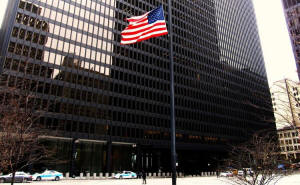Defendants in corruption case don't want expert to testify about Chicago
politics
 Send a link to a friend
Send a link to a friend
 [February 24, 2023]
By Brett Rowland | The Center Square [February 24, 2023]
By Brett Rowland | The Center Square
(The Center Square) – Attorneys representing four people indicted in a
federal bribery and conspiracy case involving Illinois' largest utility
company are worried about a political science professor.
They are concerned the expert witness' explanations of how Chicago's
political machine works could make their clients look guilty in front of
a jury at an upcoming trial.
Federal prosecutors want University of Illinois at Chicago Professor
Emeritus Dick Simpson to explain Chicago’s Ward system, "including the
operation of the political machine as it works through the Ward
political organizations including the Ward Committeeperson, precinct
captains and patronage hiring." Prosecutors said in a motion that
Simpson's testimony would be "narrowly tailored" to "topics that are
relevant to the trial and will likely be unfamiliar to the jury."
The defense attorneys said Simpson's testimony wasn't relevant.
"Professor Simpson’s unreliable, irrelevant, cumulative, and prejudicial
testimony is a transparent attempt to paint the four defendants with the
broad brush of Chicago political corruption," the attorneys wrote in a
motion seeking to keep Simpson's testimony out of the trial.

Prosecutors contend it is necessary background for a case that involves
former politicians, a former utility executive and lobbyists with
connections to Michael Madigan, the former Illinois Speaker of the House
long seen as the state's most powerful politician because he for many
years controlled both the lower legislative chamber and served as the
chairman of the Democratic Party of Illinois.
Prosecutors charged former ComEd CEO Anne Pramaggiore, former ComEd
lobbyist John Hooker, former ComEd consultant Jay Doherty and former
lobbyist and Madigan confidante Michael McClain with bribery conspiracy,
bribery, and willfully falsifying ComEd books and records in November
2020. All pleaded "not guilty" to the charges.
[to top of second column]
|

The Everett McKinley Dirksen United
States Courthouse in downtown Chicago, Illinois. (Ken Lund | Flickr
via Creative Commons)

Simpson, who got a Ph.D. in political science from Indiana University,
has served on the faculty at the University of Illinois at Chicago since
1967. He has a 28-page curriculum vitae. Prosecutors said he's the
"foremost expert in Chicago politics and government." He's written
extensively in books and scholarly journals about politics, with a focus
on Chicago politics. He also served as a Chicago Alderman for eight
years from 1971 to 1979. Prosecutors also noted that Simpson served as
an expert witness in other trials, including a case involving sham
political candidates in Madigan's former district. Simpson declined to
comment because he's an expert witness in the case.
Kent Redfield, a professor emeritus of political science with the
University of Illinois, said prosecutors want to be able to explain to a
jury how the political system is supposed to work.
"You want somebody that's got a sense of what's reasonable in terms of
the way the process is supposed to work," he said. "And where's the line
in terms of when you go from the necessity for compromise and building
consensus to when you cross over into things that you would recognize as
bribery, extortion, fraud ... that go beyond the normal give and take of
politics."
Redfield said the defense attorneys are concerned about how the jury
could take that explanation, especially if jurors have preconceived
notions about Chicago politics.
"If you've got a jury that already believes that politics are corrupt in
Illinois and politics are particularly corrupt in Chicago – Chicago
politicians are kind of the quintessential example of that – then [the
defense is] concerned," he said. "How does my client get a fair trial?"
Prosecutors, in response to the defense motion to exclude Simpson, wrote
that Simpson's "testimony will provide critical context to the evidence
in this case."
A judge is expected to rule on the motion before the April trial.
Brett Rowland is an award-winning journalist who has
worked as an editor and reporter in newsrooms in Illinois and Wisconsin.
He is an investigative reporter for The Center Square |